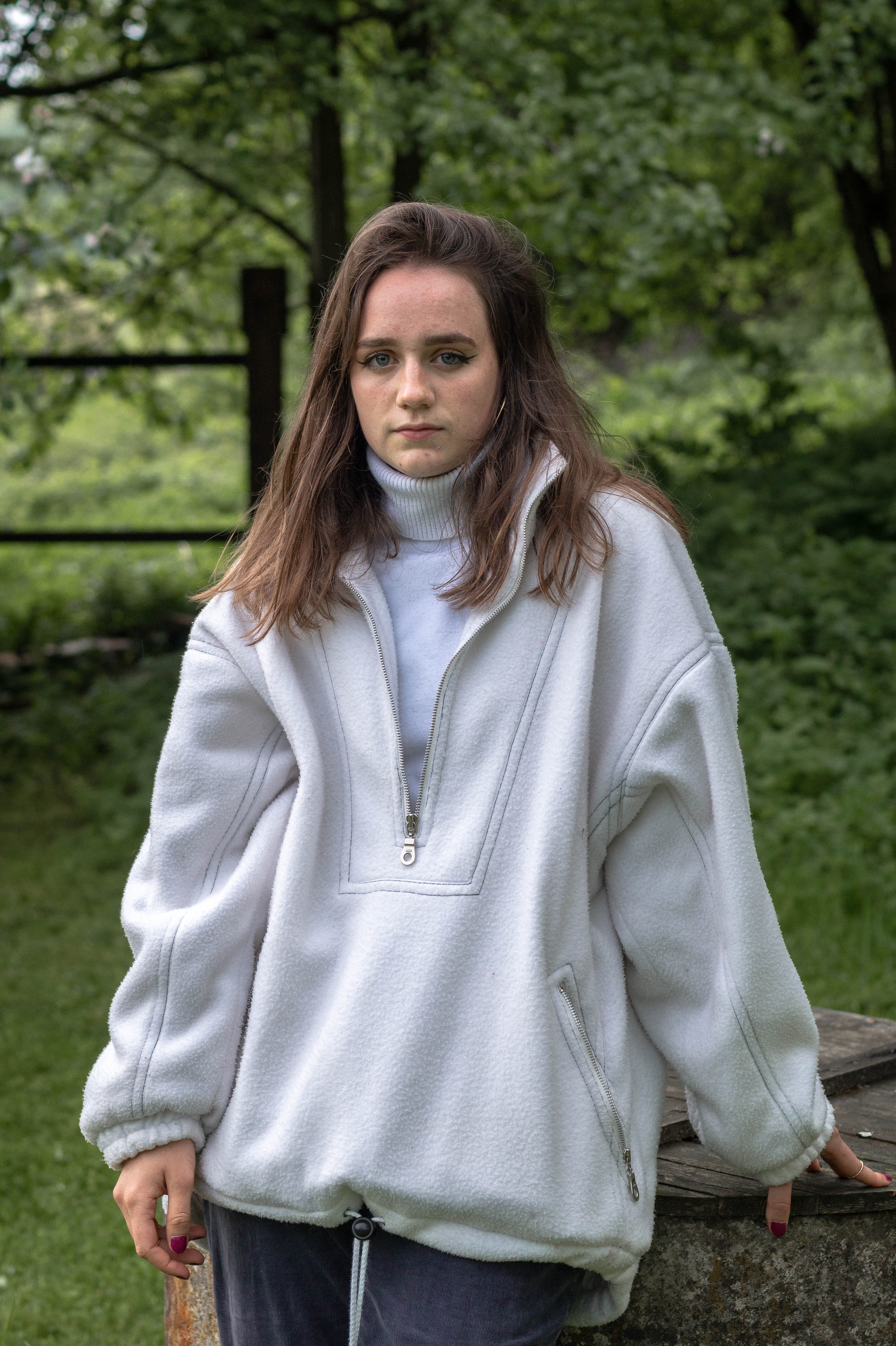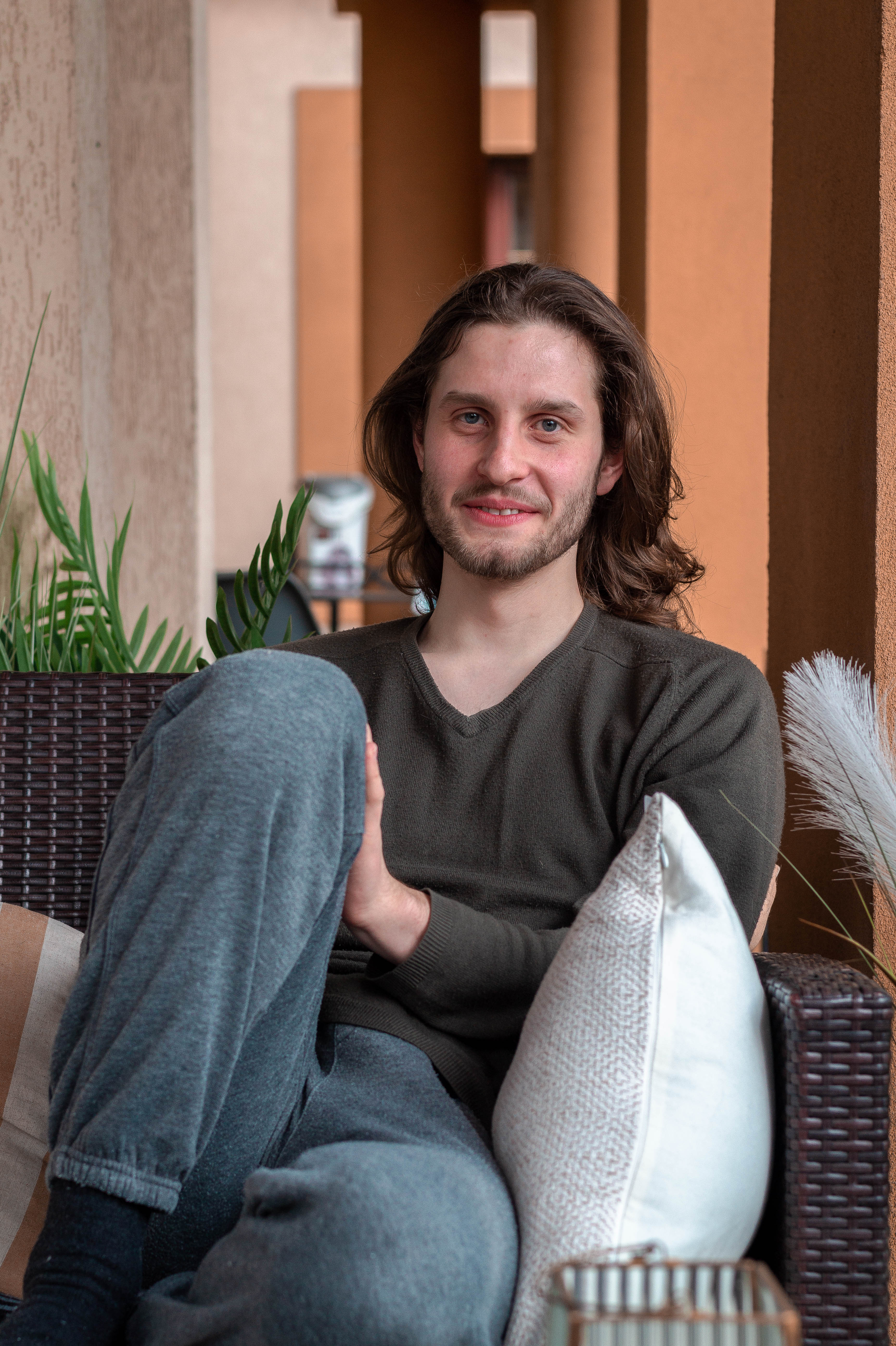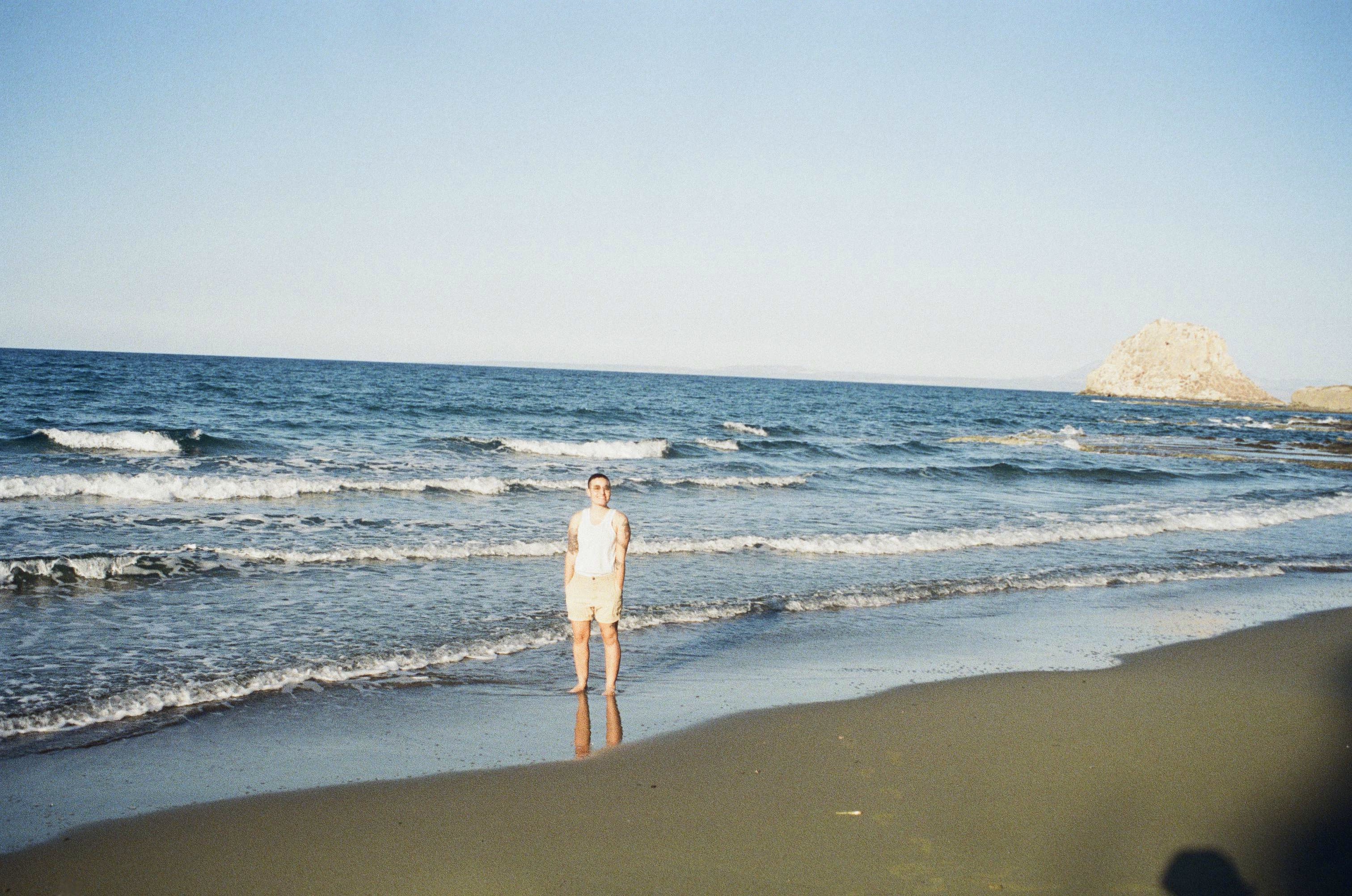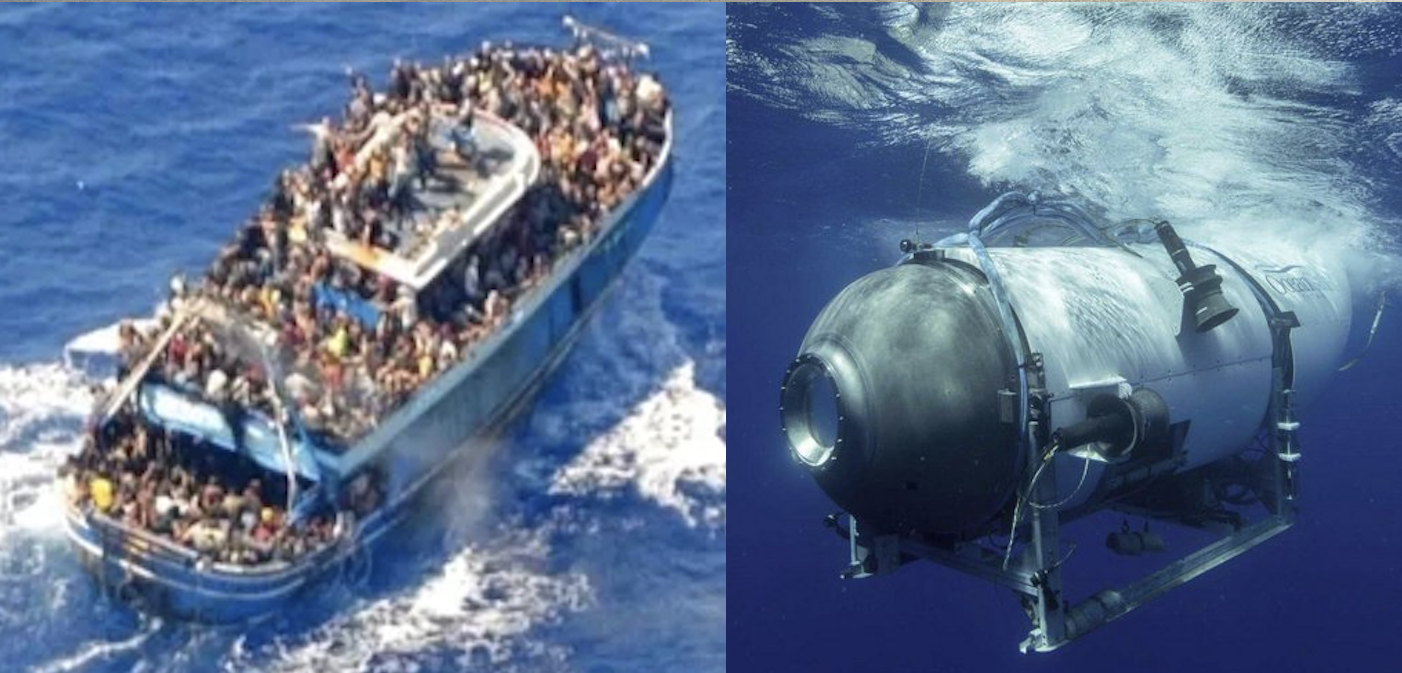Pride: Battered by hate laws, Poland's LGBTQ youth is pushing back
Even as some young Polish LGBTQ+ people settle in exile, others are pushing back against new homophobic legislation - and old prejudice.
In Poland’s more remote areas, being LGBTQ+ means learning hard, early lessons: when to hide and when to fight, and how to navigate the social constrictions of a rural, deeply conservative, Christian society.
Leszek, 23, has learned these lessons as well as anyone, having lived for most of his life in the small town of Sanok, less than 50 km from both the Ukraine and Slovakian borders. Across Poland, discrimination, and violence against LGBTQ+ people are usually higher than the EU average according to a survey conducted by the EU Agency for Fundamental Rights. 42% said they were harassed and 39% of high school students said they felt they had to hide their sexual identity.
“It's about fighting. We are fighting to make our own life,” Leszek says reflecting on his time growing up gay in his hometown. “To make this life something that we can call our own, not to live the way our family and society forces us to live.” Leszek chooses to stay away from Sanok and fears how the community will perceive him too much to move back.
The LGBTQ+ crackdowns
In the spring of 2020, a third of Poland’s local and regional governments passed anti-LGBTQ+ legislation, openly declaring themselves ‘pro-family’ or against ‘LGBT ideology’ and setting up effective ‘LGBT-free zones’, as they were called unofficially. These zones were characterised by their banning of equality marches, removal of pride flags and censorship of any content deemed ‘obscene’. Many of these regions backpedalled in the autumn of 2021 due to the threat of cutting funds from the EU. Others have not, and, at any rate, the message to the LGBTQ+ community was clear.
Poland, where over 92% of the population identify as Roman Catholic, is an overwhelmingly religious country. This is especially the case within the more rural east of the country, with the Podkarpackie region being the most devout. The ruling Law and Justice party (PiS) has a big support base in the regio, adding to the close relationship between the church and politics.
“The ruling party really adopted a strategy of coming after queer people,” says Jacub (pictured at the top of this article), 23, from the village of Zarszyn, a few km from Sanok. Jacub moved from Poland to Austria shortly after high school in 2020 when the 'LGBT-free zones' were in full effect in many areas of the country. “What happened is actually the opposite because they brought queerness into the public conversation, which began negatively, but people started realising it’s not that big an issue.”
“I don’t think I would be alive if I didn’t hide it,” he says rubbing his hand on the back of his head where a red ink tattoo reads ‘fight for yourself’
Marzelina, 23, also grew up in Lesko but now lives in Wroclaw where she studies and has created a queer society at her university. “The guilt that I felt when I thought about God not wanting me to be gay. When I was 12 or 13, I was thinking about the fact that I was going to end up in hell because I want to be with a girl.” Keeping her feelings a secret, she suppressed who she was in order to avoid conflict with her family and community. “I was in this numb place where I didn’t allow myself to feel anything. It was a sort of coping mechanism for me because I started only to date girls only when I was here in Wroclaw.”

Marzelina
Like Leszek, Marzelina has been left discouraged by their experiences growing up in the rural east, and have no plans to move back, continuing the cyclical nature of all the potential LGBTQ+ role models for the younger generation leaving.
Living abroad
Now living in Vienna, Jacub is like many Poles who move away from their rural communities to bigger cities, or abroad, thankful that they are living somewhere where being open with your sexuality is less of an issue.
“I don’t think I would be alive if I didn’t hide it,” he says rubbing his hand on the back of his head where a red ink tattoo reads ‘fight for yourself’.
Jacub’s conversion therapy began with a meeting with a bishop near his village where his ‘sexuality issue’ was brought up, with the bishop talking about his openly gay relationship, saying, “It’s just sad for the other boy that he has to be broken by you.” The second attempt by the family to alter his sexuality came when they visited an exorcist in a one-on-one session where he was asked whether he rejected the ‘evil spirit’ of homosexuality as the exorcist laid his hands on a book of miracles.
It was after visiting a shaman near the Polish-Ukrainian border who attempted to ‘ease the pressure’ from his heart by way of massage that Jacub stopped giving in to attempts made by his mother to change him.
“She’s a very catholic woman and I guess you can’t blame her for her reactions, but she took it hard.” On reflection, Jacub has come to terms with the ‘that’s how things are’ attitude. “I think the hardest part about this whole thing wasn’t the conversion therapy, but the realisation that I could lose my mum for something that I can’t change or want to change, that’s the hardest thing.”
In Vienna, Jacub finds more comfort and security in being himself, but at the loss of his own cultural home. Although a fluent German speaker, Jacub’s story speaks of the story of many persecuted LGBTQ+ living in Eastern Europe, making the choice whether to give up their sexual identity, or their cultural one.
A turning point
The summer after the zones were declared protests erupted across the country. These ‘rainbow strikes’ as they were called brought international attention to Poland, making the questions surrounding the LGBTQ+ community a conversation topic across the country and Europe.
“I remember I was very angry about it, so I thought I’m not going to hide again. I opened up because there was too much going on in the country” says Benek, 18. For Benek and others these laws were a provocation, inspiring them to action. Representing a new generation that has come of age in the shadow of the 'LGBT-free zones', Benek represents a freshly defiant generation of Poland’s LGBTQ+ community.

Lescek
Last summer, Sanok held its first Pride march marking a significant step towards LGBTQ+ recognition within the region. “My first thought was that it is going to be dangerous,” Benek said about beginning the organisation for the march. “This is a dangerous place for LGBT+ people and we got a tip that there was going to be 14 of these football hooligan teams at our pride march with rocks and bottles.”
The past four years have seen a rise in homophobia on a political level, but with this came a rise in consciousness and activism that pushes back
Benek got letters from the local government advising them not to proceed and with Catholic rosary services organised on the same day by religious organisers, it looked as though the march might be cancelled. Fortunately, an away game took most of the hooligans away from Sanok, leaving only a small group shouting slander and throwing eggs, and the march continued around the borders of the town with police observing the route.
With the support of local and national LGBTQ+ activists, the march was a signifier that things could change and that there was a community of supporters within this small corner of rural Poland. This is just one of a few examples that Poland’s attitudes towards LGBTQ+ communities are changing, where in the small town of Milicz, a Pride march was organised a month earlier.
Benek knows change is slow but also how much the community has progressed when looking at how it was. “My aunt is six years older than me and when she was in school, she had to be in the closet because all her openly gay friends were getting openly beaten. Now I see 14-year-olds with pride bags in my school and there’s a lot of them. People who have these pins with their pronouns, this wasn’t possible when I was their age and especially not my aunts.” Just a few years before, the suicide of Dominik Szymański made national headlines as a victim of relentless bullying towards LGBTQ+ people.
Nearby Lesko is also one of the most recent counties to repeal its resolution against ‘LGBT ideology’, doing so in April 2023 when councillors voted to get rid of the policy adopted in 2019. On the activist-created ‘hate atlas’, which is a map showing the regions in Poland where the 'LGBT-free zones' have been repealed and where they are still in effect, Lesko County has turned from red to green.
For those like Jacub, Leszek and Mazelina who have left their rural experiences behind, living comfortably within bigger cities, the question is whether there is any responsibility to be the role models of LGBTQ+ people that they needed in their own adolescence. “Even today I have guilt for running away and not staying to help build a better Poland,” Jacub says.
For Benek and those younger than him Poland has changed from the time of their older relatives, in terms of acceptability, progress and general awareness within the country. The past four years have seen a rise in homophobia on a political level, but with this came a rise in consciousness and activism that pushes back.
A new study by ILGA Europe assessing European countries’ equality for LGBT+ peoples marked Poland as one of the lowest, slightly higher than a select few countries including Belarus and Russia. Although there is a long road ahead the future looks bright with another Pride march in Sanok set to take place this summer.
Benek, and others like him, leave behind not only an example for future LGBTQ+ youth within this rural community, but they show hope of change for those who have already left, such as Marzelina and Leszek. “It’s kind of masochistic to be gay and stay in Poland, but I like to fight.” Benek proclaims with a smile across his face. With this attitude, the coming generations of Polish LGBTQ+ will have less to hide from than their predecessors did.
Take action
- Donations are accepted to Lambda Warszawa, an organisation offering professional support to those in the community who are in crisis.
- Fundraising, newsletter subscription and individual donations can be given to ILGA-Europe (International Lesbian, Gay, Trans and Intersex Association), an NGO umbrella organisation co-funded by the EU which unites activists from across Europe to effect change in Europe.
- Donations can be sent to the Polish Pride Alliance, a collective group of LGBTQ+ activists working in Poland to help organise equality marches and support the wider community.
The Lead is now on Substack.
Become a Member, and get our most groundbreaking content first. Become a Founder, and join the newsroom’s internal conversation - meet the writers, the editors and more.





